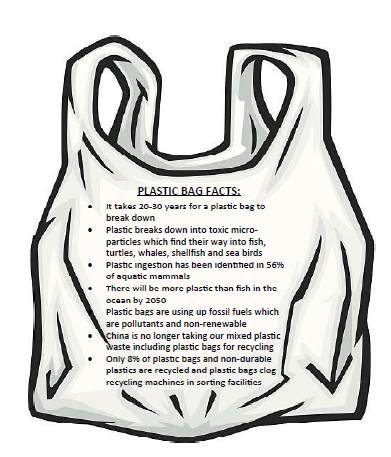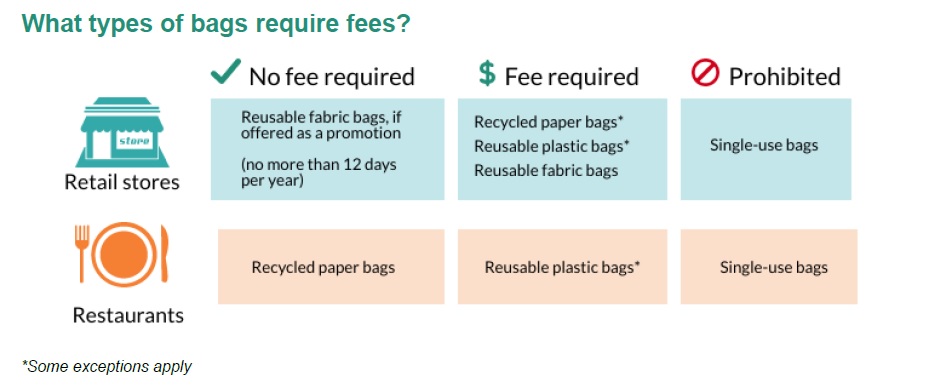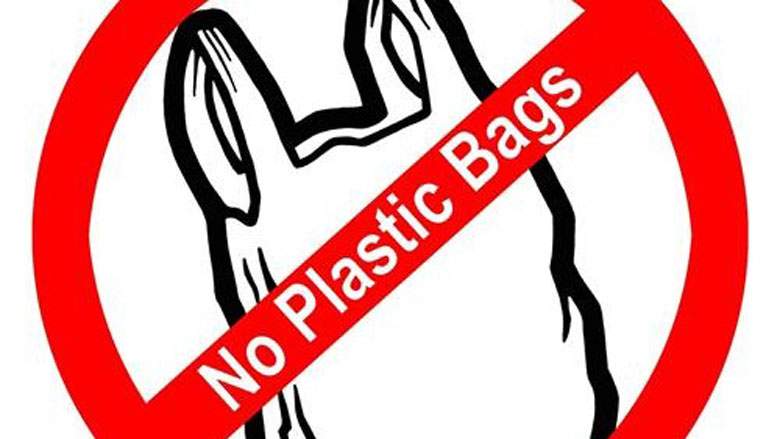Starting January 1, 2020, grocery stores and restaurants in Oregon will not be allowed to provide free single-use plastic bags.
To avoid having to pay five cents for every paper bag, shopping trips will require a bit more preparation – and we’ll have to remember to bring our bags in from the car! You will also notice that restaurants will only provide straws upon request. We’ll get used to these new practices quickly, and soon bringing in our own bags will become a habit just like bringing in our wallets/purses, or reading glasses, and maybe even our coffee cups.
FAQ – Frequently Asked Questions about the “Bag Ban”:
What is the Sustainable Shopping Initiative?
House Bill (HB) 2509, passed in the 2019 Oregon legislative session, prohibits retail stores and restaurants from providing single-use checkout bags to customers, and places restrictions on other checkout bags they may provide. The ban goes into effect on January 1, 2020. After that, a retail store or restaurant may provide only reusable or recycled paper checkout bags to customers. In certain cases, they must charge a fee to customers for providing the bag. The new law repeals ORS 459A.695, which required retail stores providing plastic checkout bags to offer paper bags as an alternative.

Why is this Initiative important?
By encouraging the switch to reusable or recycled paper bags, Oregon can reduce the amounts of single-use bags that are used and thrown out, while addressing a significant problem for Oregon’s recycling programs: plastic bags. When plastic bags end up in recycling bins, they can contaminate the recycling stream and endanger the safety of workers who must untangle them from recycling equipment. This is also a positive first step towards addressing the large amount of plastic debris in the oceans, which threatens Oregon’s marine wildlife.
What does this mean for consumers?
For consumers who do not bring reusable bags, expect to pay a small fee at the register. This fee helps offset the cost businesses pay to purchase more sustainable bags. This fee can vary by store and city/ county. Some bags, such as those for bulk items and privacy purposes, are not covered. Retail stores and restaurants may provide certain reusable bags for free to customers using a WIC voucher or electronic benefits transfer card.
What do businesses and local governments need to know?
After January 1, 2020, businesses can no longer provide single-use bags and must charge a fee for certain types of reusable bags. NOTE: If your business has a supply of single-use plastic bags, it is suggested to continue to use these, and not to add to the waste stream by throwing them out. If reported to the local jurisdiction in charge of enforcement, most likely that just a warning will be given, and the business will not be fined.
Definitions
Single-use checkout bag: A bag made of paper, plastic, or other material that is provided to a customer at the time of checkout, and that does not meet the definition of recycled paper checkout bag, reusable fabric checkout bag, or reusable plastic checkout bag.
Reusable Plastic Checkout Bag: A bag with handles, designed and manufactured to be used multiple times, and made of durable plastic that is at least 4 mils thick.
Reusable Fabric Checkout Bag: A bag with handles, designed and manufactured to be used multiple times, and made of cloth or other machine-washable fabric.
Recycled Paper Checkout Bag: A paper bag made of at least 40% postconsumer recycled fiber.

How much is the fee and where does it go? Check with local jurisdictions. HB 2509 requires a charge of at least five cents for the “Fee Required” checkout bags, but allows local governments to require higher fees locally. Businesses keep the fee, which allows them to recover costs in providing reusable bags.
Are there any exceptions provided? The single-use checkout bag ban does not apply to bags provided to customers at a time other than checkout, which includes:
• Bags designed to hold bulk items such as small hardware or for sanitary or privacy purposes;
• Certain specialty bags, such as garment bags;
• Bags sold in a package for uses such as food storage, garbage or pet waste.
Retail stores may provide recycled paper checkout bags or reusable plastic checkout bags for free to customers using a WIC voucher or electronic benefits transfer card. They may also offer reusable fabric bags for free as a promotion on 12 or fewer days in a year. Restaurants may provide reusable plastic checkout bags for free to customers using an electronic benefits transfer.
How will this be enforced? A violation of the provisions of HB 2509 is a Class D violation subject to a maximum fine of $250. Class D violations are enforced by law enforcement officers, who may issue a citation to a retailer or restaurant. Each day a retailer or restaurant commits a violation is considered a new offense. HB 2509 allows a different penalty to be set under local provisions, so check with local jurisdictions for specific questions about enforcement. A restaurant or retail store can be charged with a violation under either the local provision or the penalty specified in HB 2509, but not both.
Are there any reporting requirements? Yes. By September 15, 2024, grocers must provide the Oregon Department of Environmental Quality with information on collection of bag fees and customers’ usage of recycled paper, reusable fabric and reusable plastic checkout bags. DEQ must submit a report about this information to the legislature by September 15, 2025.
What else do local governments need to know? HB 2509 generally preempts, or overrides, any existing local bag policy. Aside from setting a higher fee and penalty in their jurisdictions, local governments may not adopt local provisions with definitions, requirements or restrictions that differ from HB 2509.


